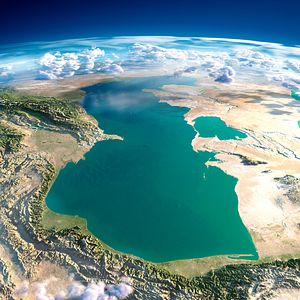In a region as riven with inter-state disputes as Central Asia – arguably the least-integrated region extant – any governmental agreement is usually as welcome as it is rare. (So long as it doesn’t pertain to mutually blacklisting activists, at least.) This week presented such an instance, with Kazakhstan and Turkmenistan reportedly agreeing to a maritime border in the Caspian.
Caspian demarcation has long been something of a bête noire for the region. Following the disintegration of the Soviet Union, littoral governments professed a willingness to delineate proper boundaries and allocations. Year after year, however, ownership over the Caspian Sea remained in question. Some – Iran especially – consider the Caspian a “lake,” based both upon bilateral treaties maintained with the Soviet Union as well as the greater resource allocation Tehran receives with such title. Others prefer “sea,” both because the demarcation would bring regulation from the United Nations Convention on the Seas and because of greater resource allocation on their respective end(s).
The recent demarcation between Kazakhstan and Turkmenistan does little to determine the Caspian’s lasting status as sea or lake, but, as RFE/RL’s Bruce Pannier notes, “[m]edia in both countries suggest the agreement recognizes the sovereign rights of each country in their sectors of the Caspian, including the right to develop and use the resources found within their national sectors.” Kazakhstan and Turkmenistan have enjoyed one of the warmest bilateral relations of Central Asian states in the post-Soviet period – though that may not necessarily be saying much – and the agreement should help placate certain of the lingering issues between Ashgabat and Astana. Indeed, taken on the back of increased pipeline and rail connectivity, Kazakhstan and Turkmenistan may well prove the closest bilateral relationship of any Central Asian governments.
But relations with Astana likely weren’t the foremost driver from Turkmenistan’s end in getting this Caspian deal done. As Pannier continues, “The Kazakh-Turkmen maritime demarcation deal strengthens Turkmenistan’s claim on rights to use its sector for whatever purposes it wishes – building a pipeline, for example – without consulting the other littoral states.” This is the likely rub. Over the past few weeks, Turkmenistan has been making the rounds in lobbying for external clients for its gas, such that it doesn’t need to rely solely on its status as a client-state for Chinese fuel demands. With ongoing delays in the TAPI pipeline to India, with potential deals with Iran still far from fruition, and with Russia continuing to slash its import of Turkmen gas, Ashgabat has been doing what it can to lobby for a Trans-Caspian Pipeline (TCP).
And Turkmenistan’s newfound efforts at pushing the TCP haven’t gone unnoticed. Earlier this month, European Commission Vice President Maros Sefcovic put a date on the EU’s planned import of Turkmen gas: “Europe expects supplies of Turkmen gas to begin by 2019.” As The Diplomat’s Paolo Sorbello has observed, “This is the first time the EU has put a date on what has traditionally been regarded as a pipe dream. … The chief resistance to this option came from other Caspian littoral countries, such as Russia and Iran, which were still unconvinced about the legal status of the Caspian.”
To be sure, despite swelling effort from Brussels, Ashgabat, and Baku, the pipeline remains far from reality, with concerns ranging from supply to safety. (For a pair of conversations on the matter, I’d suggest listening to both Qishloq Ovozi’s recent podcast and Nate Schenkkan’s conversation with Muhammad Tahir, director of RFE/RL’s Turkmen service.) But Sefcovic’s comment – while not an endorsement of TCP, necessarily – shouldn’t be overlooked.
Nor should the role the TCP has played in bringing Azerbaijan and Turkmenistan back from the enmity they only recently shared. Just a few years ago, in the midst of a “Caspian arms race,” Azerbaijan and Turkmenistan found themselves consistently sniping at one another over disputed fields – with Azerbaijani media going so far as to claim that Turkmenistan was “clearly ready to unleash a war with Azerbaijan over disputed field.” Now, the two are working nearly hand-in-glove to try to bring the TCP to bear.
Which brings us back to Caspian demarcation. To governments in Turkmenistan and Azerbaijan, all that is needed for pipeline construction is agreement within the two nations. Turkmenistan’s recent agreement with Kazakhstan, while still not resulting in the final decision about the Caspian’s status, is nonetheless a welcome sign for those who would wish to bring the TCP to bear. And if nothing else, it’s also a welcome sign in a region that hasn’t had much reason for optimism lately.
































